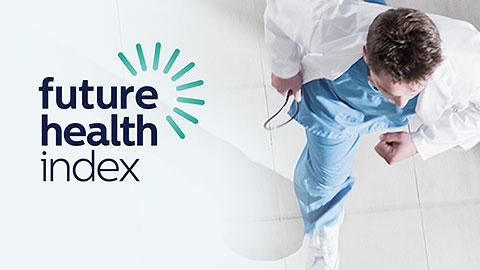The Philips Future Health Index 2025: How AI Will Reshape Global Healthcare

Table of Contents
AI-Driven Diagnostics and Treatment
The integration of AI in healthcare promises to significantly improve diagnostic accuracy and speed, as well as personalize treatment plans.
Improved Accuracy and Speed of Diagnosis
AI algorithms are capable of analyzing medical images – X-rays, CT scans, MRIs – with remarkable speed and accuracy, often surpassing human capabilities. This leads to earlier and more precise diagnoses, improving patient outcomes.
- AI in Radiology: AI-powered tools can detect subtle anomalies in medical images, like early signs of cancer or other diseases, that might be missed by the human eye. Studies show AI can improve the detection rate of certain cancers by up to 15%.
- AI in Pathology: AI assists pathologists in analyzing tissue samples, identifying cancerous cells, and classifying diseases with greater precision and speed. This accelerates the diagnostic process and enables quicker treatment decisions.
- AI in Oncology: AI algorithms analyze patient data, including genetic information and tumor characteristics, to predict treatment response and personalize cancer therapies.
Personalized Medicine and Treatment Plans
AI’s ability to process vast amounts of patient data – genetics, lifestyle, medical history, and treatment responses – enables the creation of personalized medicine and treatment plans. This precision approach maximizes treatment effectiveness while minimizing adverse side effects.
- AI in Drug Discovery: AI accelerates the drug discovery process by identifying potential drug candidates and predicting their efficacy. This reduces development time and costs.
- AI in Clinical Trials: AI optimizes clinical trial design, patient selection, and data analysis, leading to more efficient and successful trials.
- Personalized Cancer Treatment: AI analyzes a patient's tumor's genetic makeup to determine the most effective treatment strategy, including targeted therapies and immunotherapy.
Enhanced Access and Efficiency in Healthcare
AI promises to significantly enhance access to healthcare and streamline operations, making healthcare more efficient and affordable.
Remote Patient Monitoring and Telemedicine
AI-powered tools are revolutionizing remote patient monitoring (RPM), enabling continuous tracking of vital signs and early detection of health issues. This reduces hospital readmissions and improves patient outcomes. AI also plays a crucial role in expanding access to healthcare through telemedicine.
- Wearable Health Tech: Smartwatches and fitness trackers, coupled with AI algorithms, monitor heart rate, sleep patterns, and activity levels, providing valuable insights into a patient's health.
- Remote Monitoring Devices: Devices that monitor blood pressure, glucose levels, and other vital signs remotely, transmitting data to healthcare providers for analysis.
- AI-Powered Telehealth Platforms: AI enhances telehealth consultations by providing automated diagnosis support, medical record management, and appointment scheduling. This extends access to care for patients in rural or underserved areas.
Streamlining Administrative Tasks and Reducing Costs
AI can automate numerous administrative tasks, freeing up healthcare professionals to focus on patient care. This leads to increased efficiency and significant cost savings.
- AI-Powered Administrative Tools: AI automates tasks like appointment scheduling, medical record management, and insurance claim processing.
- Robotic Process Automation (RPA): RPA automates repetitive administrative tasks, improving efficiency and reducing human error.
- AI-Driven Claims Processing: AI accelerates claims processing, reducing delays and improving reimbursement rates for healthcare providers.
Addressing Ethical and Societal Concerns
While the potential benefits of AI in healthcare are substantial, it's crucial to address ethical and societal concerns.
Data Privacy and Security
The use of AI in healthcare requires robust data privacy and security measures to protect sensitive patient information. Data breaches can have severe consequences, impacting patient trust and healthcare operations.
- Data Encryption: Encrypting patient data ensures its confidentiality, even if it’s accessed by unauthorized individuals.
- Anonymization Techniques: Techniques that remove or mask identifying information from patient data to protect privacy.
- HIPAA and GDPR Compliance: Adherence to regulations such as HIPAA (in the US) and GDPR (in Europe) is crucial to ensure compliance with data privacy laws.
Bias and Fairness in AI Algorithms
AI algorithms are trained on data, and if this data reflects existing biases, the algorithms may perpetuate and even amplify these biases. Ensuring fairness and equity in AI-powered healthcare is paramount.
- Algorithmic Bias Mitigation Techniques: Techniques to identify and mitigate bias in AI algorithms, such as using diverse datasets and employing fairness-aware algorithms.
- Diverse Datasets: Using datasets that represent the diversity of the population to minimize bias and ensure equitable outcomes.
Conclusion
The Philips Future Health Index 2025 clearly indicates that AI is poised to transform global healthcare through improved diagnostics, enhanced access, and increased efficiency. AI-driven solutions offer the potential for earlier and more accurate diagnoses, personalized treatments, and streamlined administrative processes. However, it's crucial to address ethical concerns regarding data privacy and algorithmic bias to ensure that the benefits of AI are accessible and equitable for all. The Philips Future Health Index 2025 offers a detailed look at these transformative trends. Learn more and explore the future of AI in healthcare by accessing the full report [link to report - replace with actual link if available].

Featured Posts
-
 Pobediteli Evrovideniya Poslednie 10 Let Gde Oni Seychas
May 25, 2025
Pobediteli Evrovideniya Poslednie 10 Let Gde Oni Seychas
May 25, 2025 -
 Full Soundtrack List Picture This Prime Videos Latest Rom Com
May 25, 2025
Full Soundtrack List Picture This Prime Videos Latest Rom Com
May 25, 2025 -
 Paris Fashion Week Amira Al Zuhairs Debut For Zimmermann
May 25, 2025
Paris Fashion Week Amira Al Zuhairs Debut For Zimmermann
May 25, 2025 -
 Ftc To Appeal Microsofts Activision Blizzard Acquisition In Jeopardy
May 25, 2025
Ftc To Appeal Microsofts Activision Blizzard Acquisition In Jeopardy
May 25, 2025 -
 Joy Crookes Shares Powerful New Song I Know You D Kill
May 25, 2025
Joy Crookes Shares Powerful New Song I Know You D Kill
May 25, 2025
Latest Posts
-
 Rio Tinto Rebuts Forrests Wasteland Claims Pilbaras Future Defended
May 25, 2025
Rio Tinto Rebuts Forrests Wasteland Claims Pilbaras Future Defended
May 25, 2025 -
 China Market Troubles Beyond Bmw And Porsche
May 25, 2025
China Market Troubles Beyond Bmw And Porsche
May 25, 2025 -
 Invest Smart A Guide To The Countrys Busiest New Business Areas
May 25, 2025
Invest Smart A Guide To The Countrys Busiest New Business Areas
May 25, 2025 -
 Hollywood Production Halts As Sag Aftra Joins Wga On Strike
May 25, 2025
Hollywood Production Halts As Sag Aftra Joins Wga On Strike
May 25, 2025 -
 Delayed Promotions Accenture To Upgrade 50 000 Staff Members
May 25, 2025
Delayed Promotions Accenture To Upgrade 50 000 Staff Members
May 25, 2025
